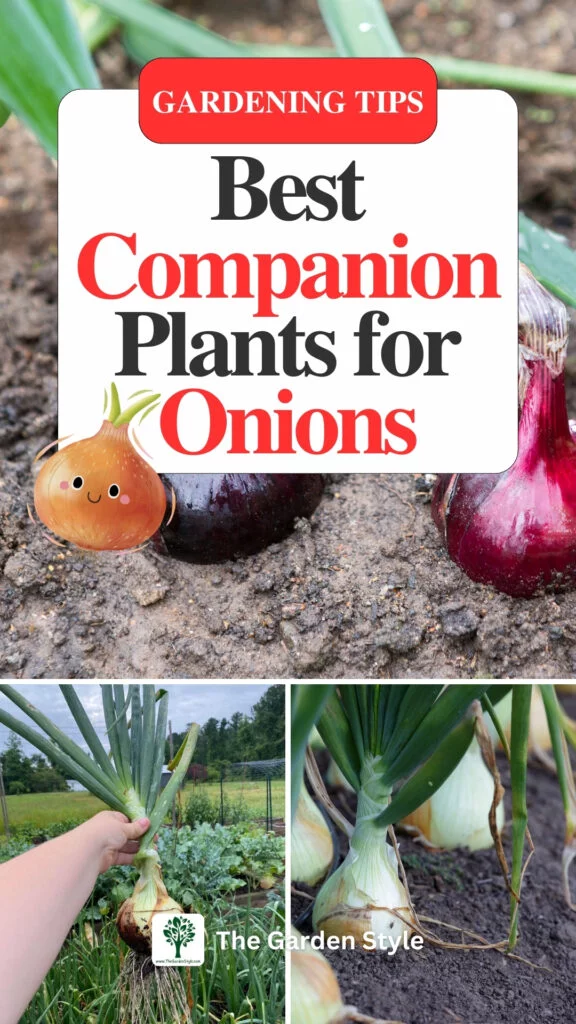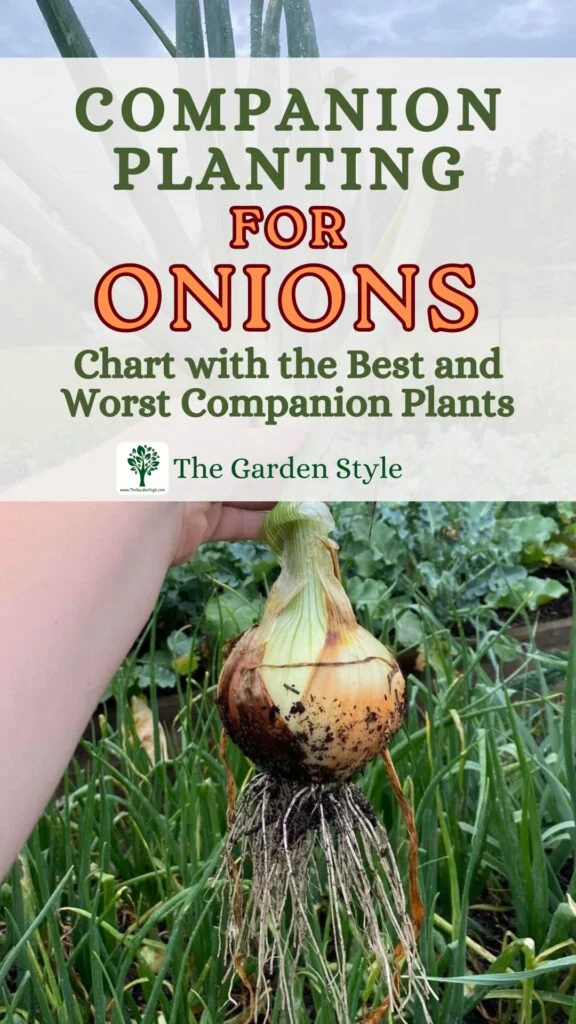Are you struggling to grow a bountiful onion crop? Look no further than the ancient practice of companion planting with companion plants for onions! By strategically planting certain plants alongside your onions, you can create a symbiotic environment that boosts growth, deters pests, and maximizes yields. Let’s dive into the best companion plants for onions for your onion patch!
Table of Contents
What is Companion Planting?
Companion planting is the art of growing different plants together in a way that benefits each other. It’s a holistic approach to gardening that’s been used for centuries, taking advantage of the natural relationships between plants. Some companions help repel pests, others improve soil nutrients, and some even enhance flavor. It’s like giving your plants a support system to thrive!
The Best Companions for Onions
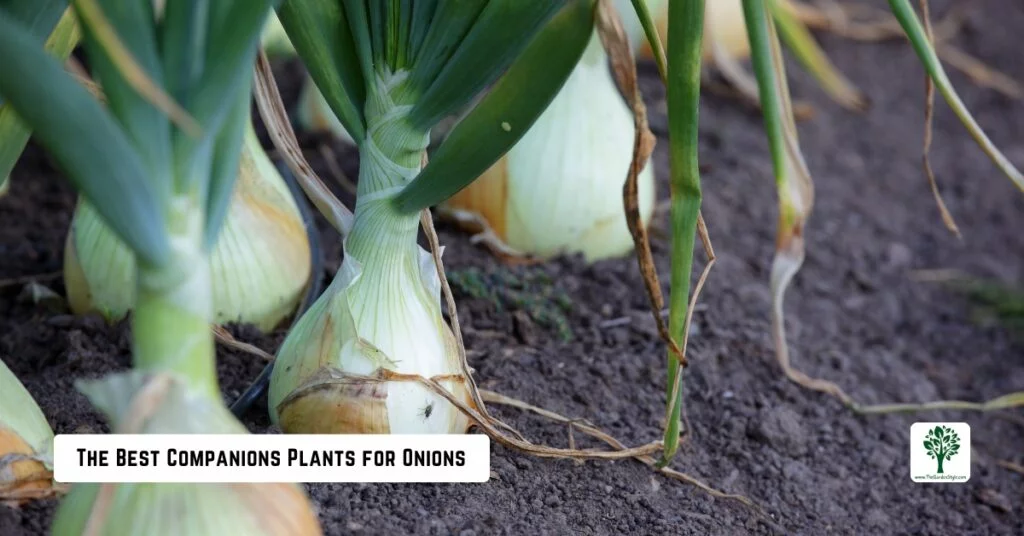
Onions might be potent flavor boosters in the kitchen, but they can also benefit from some strategic gardening partnerships with companion plants for onions. By growing certain plants alongside your onion crop, you’ll not only deter pests and enrich the soil but also maximize yields and flavor. From other vegetables and herbs to hardworking flowers, a wide variety of companion plants for onions can give your onions a healthy boost. Let’s explore what to plant with onions to unlock their full potential!
Companion Herbs for Onions
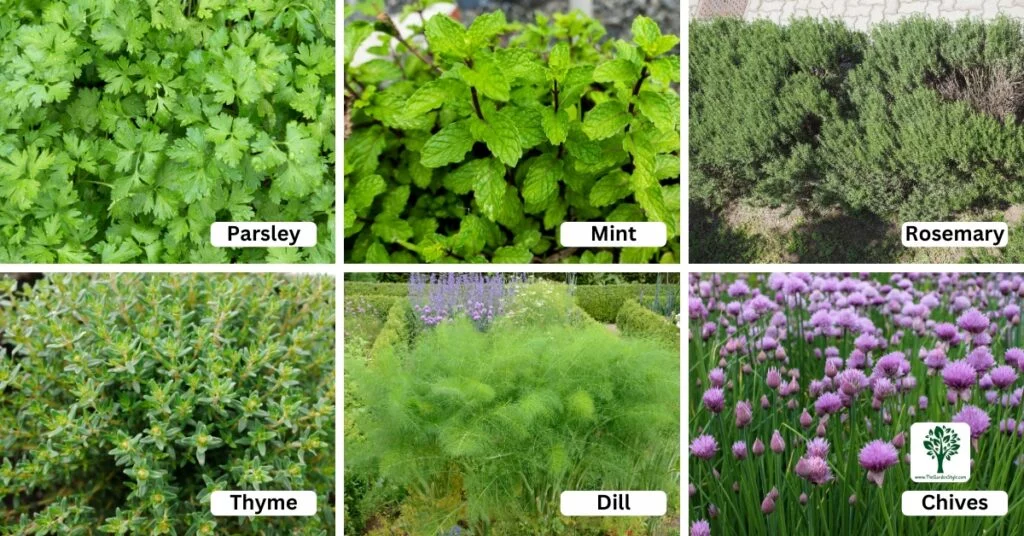
Parsley: As a biennial herb, parsley has a long taproot that can help loosen and aerate the soil for neighboring onions. Its lacy foliage also provides a habitat for beneficial insects like ladybugs and lacewings that prey on aphids and other pests. Plus, parsley is thought to enhance the flavor of onions when planted together.
Mint: The pungent aroma of mint is highly effective at repelling aphids, onion flies, cutworms, and other insect pests that might target your onion crop. Planting mint nearby can create a natural pest barrier. Just be mindful, as mint can be an aggressive spreader.
Rosemary: This woody herb is believed to improve the growth, flavor, and hardiness of onions when planted in close proximity. Rosemary also releases a strong scent that deters cabbage moths, bean beetles, and other vegetable pests. Learn how to plant rosemary.
Thyme: The compounds released by thyme make it a powerful repellent against whiteflies, cabbage loopers, tomato hornworms, and other moth species that could otherwise lay eggs on your onions. Its low-growing habit also helps retain soil moisture. Learn how to grow thyme.
Dill: The tall, feathery stalks of dill provide light shade and moisture retention benefits for onions. Plus, the small yellow dill flowers attract beneficial insects like lacewings, ladybugs, and parasitic wasps that feed on onion pests.
Chives: As a fellow allium, chives make an excellent neighbor for onions. They help deter aphids, mites, and nematodes while their grass-like foliage aerates the soil. Chopping and spreading chives around onions can also help repel rabbits and other nibbling pests. Learn how to plant chives.
Companion Vegetables for Onions
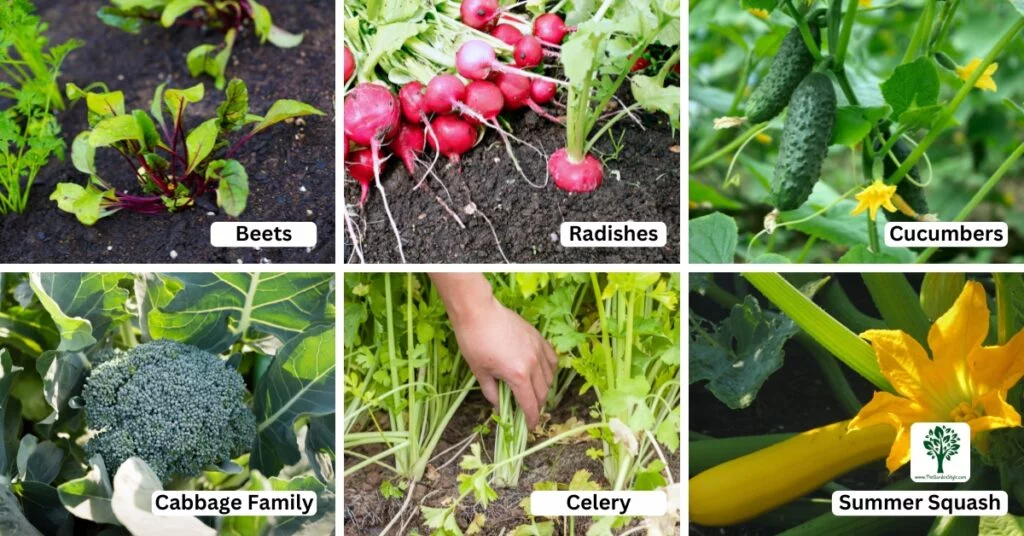
Beets: The deep taproots of beets help loosen and aerate the soil, making it easier for nearby onions to establish a strong root system. Beets also accumulate and recycle nutrients from deep in the soil profile.
Radishes: Quick-growing radishes work as excellent soil aerators thanks to their spiky root systems. Their pungent aromas also help confuse and deter onion flies, root maggots, and other underground pests. Harvest early radishes to make room for the onions.
Cucumbers: The trailing vines and broad leaves of cucumbers provide living mulch and moisture retention benefits for moisture-loving onions. They also release a protective compound that deters spider mites and aphids. Learn how to grow cucumbers.
Cabbage Family: Members of the brassica family, like broccoli, cauliflower, and kale, make good onion companions. They release pungent compounds that repel diamondback moth larvae, cabbage loopers, and other caterpillars. Learn how to grow broccoli.
Celery: Celery makes an excellent companion for onions due to its natural pest-repelling properties. It emits compounds that deter pests such as aphids, cabbage worms, and onion flies, helping to protect nearby onion plants. Additionally, celery has shallow roots that do not compete heavily with onions for nutrients, making them compatible companions in the garden. Planting celery alongside onions can create a mutually beneficial environment, promoting healthy growth and deterring pests naturally.
Summer Squash: With their large spreading leaves, summer squash varieties like zucchini act as a living mulch. This helps shade the soil, suppress weeds, and retain moisture for the shallow-rooted onion crop.
Companion Flowers for Onions
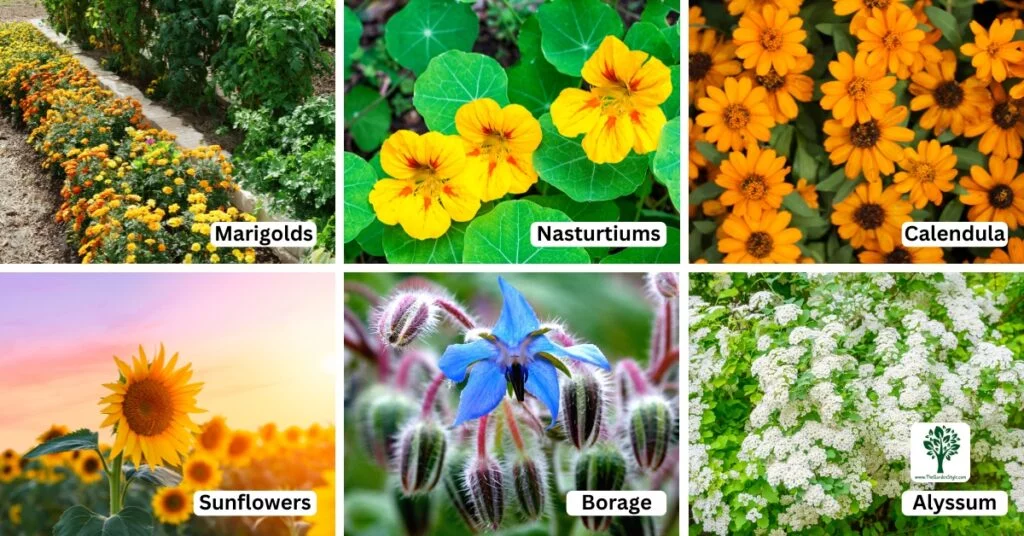
Marigolds: The distinctive scent of marigolds deters nematodes, mosquitoes, and even rabid mammals, thanks to their pyrethrum content. They’re also a trap crop for spider mites, which prefer them over onions. Learn how to grow marigolds.
Nasturtiums: While able to accumulate nutrients for nearby crops, nasturtiums are also excellent trap plants for aphids and whiteflies due to their funnel-shaped leaves and irresistible aroma. Their roots also repel nematodes, white flies, squash bugs, and wooly aphids.
Calendula: Also called pot marigolds, calendulas have long been used as a repellent for asparagus beetles, tomato worms, and nematodes in the garden. Their bright blooms also attract pollinators and pest-eating insects.
Sunflowers: In addition to providing light, partial shade, and wind protection, towering sunflowers attract many pollinators and pest predators. Their tall stalks can also serve as a natural trellis for climbing plants. Learn how to plant sunflower seeds.
Borage: The small, star-shaped blue flowers of borage are highly attractive to bees and parasitic wasps that prey on tomato hornworms, cabbage worms, and other caterpillars. Borage also accumulates calcium and other nutrients.
Alyssum: Low-growing and spreading sweet alyssum acts as a living mulch and insectary plant. It attracts many beneficial insects like syrphid flies, lacewings, and parasitic wasps while deterring aphids and slugs.
Remember, spacing and soil preparation are crucial when pairing these companions with onions. With the right plant partners and some experimentation, you can create a thriving and pest-free ecosystem for your onion crop!
At a Glance: Onions Companion Planting Chart
| Companion Plant for Onion | Type | Benefits for Onions |
| Parsley | Herb | Loosens and aerates soil, provides habitat for beneficial insects, enhances flavor |
| Mint | Herb | Repels aphids, onion flies, cutworms, and other pests |
| Rosemary | Herb | Improves growth, flavor, and hardiness; deters cabbage moths, bean beetles |
| Thyme | Herb | Repels whiteflies, cabbage loopers, tomato hornworms; retains soil moisture |
| Dill | Herb | Provides shade and moisture retention; attracts beneficial insects |
| Chives | Herb | Deters aphids, mites, and nematodes; aerates soil; repels rabbits |
| Beets | Vegetable | Loosens and aerates soil; accumulates and recycles nutrients |
| Radishes | Vegetable | Aerates soil; deters onion flies, root maggots, and other subterranean pests |
| Cucumbers | Vegetable | Provides living mulch and moisture retention; deters spider mites and aphids |
| Cabbage Family | Vegetable | Repels diamondback moth larvae, cabbage loopers, and other caterpillars |
| Celery | Vegetable | Deters aphids, cabbage worms, and onion flies; shallow roots don’t compete with onions |
| Summer Squash | Vegetable | It provides shade, suppresses weeds, and retains moisture |
| Marigolds | Flower | Deters nematodes, mosquitoes, and mammals; acts as a trap crop for spider mites |
| Nasturtiums | Flower | Accumulates nutrients; acts as a trap crop for aphids and whiteflies; repels nematodes, white flies, squash bugs, and wooly aphids |
| Calendula | Flower | Repels asparagus beetles, tomato worms, and nematodes; attracts pollinators and pest-eating insects |
| Sunflowers | Flower | Provides partial shade and wind protection; attracts pollinators and pest predators; acts as a natural trellis |
| Borage | Flower | Attracts bees and parasitic wasps that prey on caterpillars; accumulates calcium and other nutrients |
| Alyssum | Flower | Acts as a living mulch and insectary plant; attracts beneficial insects; deters aphids and slugs |
Plants to Avoid with Onions
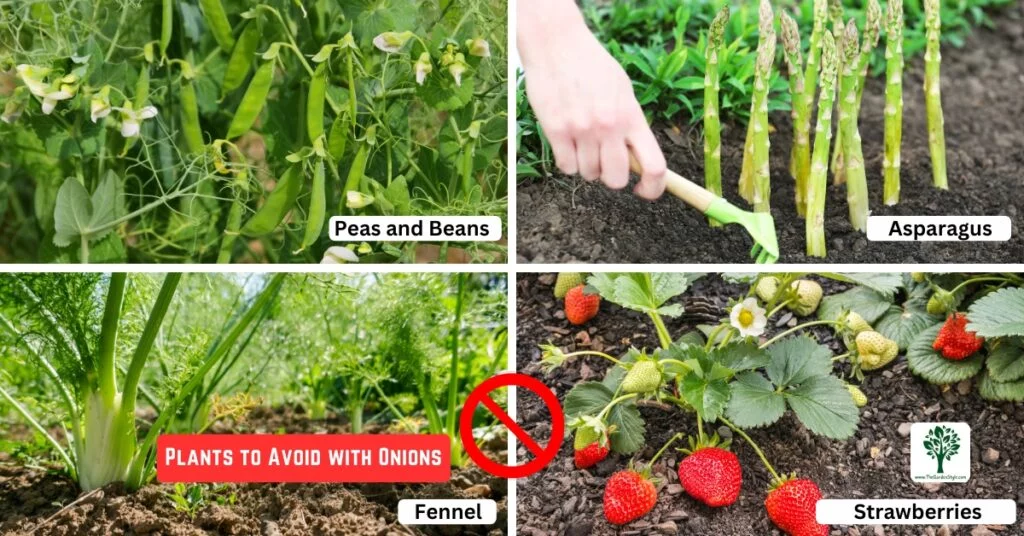
While many plants make great companions for onions, there are a few that should be kept separate.
Peas and Beans: Peas and beans might seem like harmless neighbors, but they can actually stunt the growth of your onions. These legumes release a compound that inhibits the growth of onion bulbs, resulting in smaller yields. It’s best to keep them separated in different beds or sections of your garden.
Asparagus: Asparagus is another plant that doesn’t play well with onions. These two plants have very different nutrient needs, and asparagus can outcompete onions for resources, leaving your onions stunted and underdeveloped. It’s best to dedicate separate areas of your garden to each crop.
Fennel: The fronds and bulbs of fennel plants release a compound that can stunt the growth of onion bulbs. Avoid planting these two together if you want full-sized onions.
Strawberries: You may be surprised, but strawberries make poor neighbors for onions. They release a natural germination inhibitor that can prevent onion seeds from sprouting properly when planted in the same area.
| Plants to Avoid with Onions | Reason to Avoid |
| Peas and Beans | Release a compound that inhibits the growth of onion bulbs, resulting in smaller yields. |
| Asparagus | They have very different nutrient needs, and asparagus can outcompete onions for resources, leaving onions stunted and underdeveloped. |
| Fennel | Release a compound that can stunt the growth of onion bulbs. |
| Strawberries | Release a natural germination inhibitor that can prevent onion seeds from sprouting properly when planted in the same area. |
While limited spacing may mean you can’t avoid all of these, do your best to keep these noncompatible plants separated from your onions for optimal growth and yields.
Final Conclusions
Unlocking the full potential of your onion crop is achievable by embracing the power of companion plants for onions. Through careful selection of beneficial herbs, vegetables, and flowers to plant alongside your onions, you can create a naturally pest-resistant, nutrient-rich environment perfect for onion growth and maximum yields. With the right companion plant partnerships, your onion patch will thrive season after season.
Frequently Asked Questions
The spacing will vary depending on the companion plant. As a general rule, you’ll want to allow at least 6-8 inches between low-growing plants like lettuce and 12-24 inches for larger plants like tomatoes and herbs.
Absolutely! Different onion varieties, like red, yellow, and white onions, can be planted together without issue. In fact, growing a variety can help deter pests and diseases that might target a single type.
When done properly, companion planting can indeed boost your onion yields. The right companions help improve soil quality, deter pests, and provide an overall healthier growing environment for your onions.
While you can certainly rotate the same companion plants year after year, it’s generally a good idea to mix them up. Different companions provide different benefits, and rotating them can help prevent nutrient deficiencies and pest infestations from taking hold.
If this post about the best companion plants for onions was helpful, please share it:
